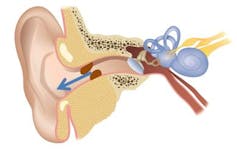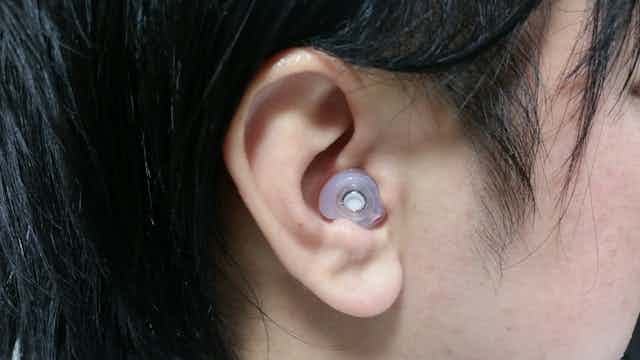“Never put anything smaller than your elbow into your ear” is something we’ve been wisely cautioned against at some stage or another. But more of us are ignoring this advice.
We use in-the-ear-headphones to listen to music, car keys and hair pins to scratch that particularly unpleasant itch, and hearing aids to enable better communication.
Many of us also use disposable foam earplugs to protect from damaging noises in the workplace, or to block the noise of snoring partners, loud traffic outside bedroom windows, dogs barking and any other bothersome sounds that prevent a good night’s sleep.
If you regularly use earplugs to sleep, is it damaging? On the internet, people ask whether doing so can cause tinnitus, infections or ear pain. Can regular earplug use cause wax or pressure build up in the head? Can it cause headaches?
The facts about wax
To answer these questions, I should first explain a few things about ear wax.
Wax is good for the ear but too much can be bad for you. Wax comes from small glands in the outer part of the ear. It starts off looking like honey but the longer it stays in the ear, the darker and harder it gets as it traps dirt, grit and gunk.

Normally the wax will be “walked” out of the ear by its self-cleaning mechanism. Anything that slows down or reverses this mechanism can cause wax to build up. Unfortunately, anything smaller than your elbow can do this, sleeping plugs included. But everyone’s ears are affected differently.
An ear full of wax works like a built-in ear plug – great for sleeping, but if it ends up resting on the eardrum, it can cause discomfort and sometimes tinnitus.
Most of the problems people associate with earplugs are actually due to too much wax in the ears, although the wax may be caused by being a consistent earplug user.
If you are a consistent user and think you may have too much wax, ask your doctor to check inside your ear. Or better still, make an appointment to see your local audiologist. They may have a camera that can show you how much wax actually is inside your ear and whether something should be done about it.
A good night’s sleep
A good night’s sleep has many health benefits, and sleeping poorly can have follow-on issues such as concentration and memory problems.
Studies have demonstrated the benefit of sleeping aids such as ear plugs and eye masks in improving sleep for patients in hospitals. In fact, the studies show the aids can reduce the need for sleeping medications.
But as with anything you wear while sleeping, comfort is crucial. So it’s important to insert the plug correctly.
Ideally, you should roll the foam plug into a skinny cylinder and then insert it deep in your ear, holding it in place until it expands (see video). If it doesn’t fall out in the night and you experience no discomfort, then excellent!
If you can’t put it in without discomfort or it comes out with dark wax over the end, or if you feel there is a build-up of pressure in the ear, then see your doctor or audiologist. They may suggest other options if you need more silence while sleeping.
In terms of allergies, there has only been one reported case of an allergic reaction to the material foam earplugs are made of.
It is also very unlikely you will develop pressure sores. And only one paper published in the last 20 years has described certain types of earplugs (mainly silicone) breaking apart in the ear canal and requiring specialist removal.
Discard the plug
It is a good idea to discard the plugs once they start to discolour. As wax builds up on the surface, earplugs become stickier and can transfer bacteria from your fingers into your ears.
Never put saliva on earplugs to lubricate the surface so they slide in easier. You have more bacteria in your mouth than your bottom, so the last thing you want is to introduce these to your ear.
Doing so will increase the risk of developing an infection in the ear canal which can cause inflammation and affect your hearing until the infection is treated.
If foam plugs are a problem, then you can get custom-made ear plugs. They are made specifically for your ears out of a soft medical-grade silicone that is easy to clean and does not fall apart in the ear.
Custom plugs are more expensive than disposable ones, but they can work out cheaper in the long term when it comes to your health being affected by poor sleep.
Some people complain about being overly distracted by noises in general which can be even worse when they try to sleep. There may be other issues underlying this sensitivity. Rather than blocking out the sound, sometimes introducing other more pleasant sounds (like the sound of a fan or the ocean) can help distract the mind.
If you’re putting earplugs in correctly and not experiencing any discomfort, you should be able to rest easy that you are doing all you can to achieve a better night’s sleep.

